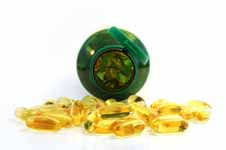Research on Fish Oils
and Depression
"Improve your Mood with Omega 3 Fish Oils!"
|
|
What are the benefits of taking fish oils and depression? Can you use this natural food supplement to reduce your symptoms?
One of the reasons to take omega 3 fish oils is they provide an excellent source of the omega 3 fatty acids, eicosahexaenoic acid (EPA) and docosahexaenoic acid (DHA).
Both of these healthy fats are critical for cellular nerve health, particularly DHA which is found in high concentrations in the brain.
Studies indicate that people with major depression may have significantly lower levels of omega 3 fatty acids (particularly DHA) compared to healthy subjects.
And further research on fish oils and depression show the supplementation of these healthy fats may lower your risk for the disease and improve the effectiveness of anti-depressant medications.
The following articles take a closer look at using fish oils for depression:
1. Fish Oils may improve Depression Symptoms

|
Taiwan - Researchers from Taiwan Medical University conducted an 8 week, double-blind, placebo-controlled trial comparing high doses (9.6 grams) of omega 3 fish oils to placebo in addition to standard antidepressant medication in 28 patients with major depressive disorder.
The patients who received the 5 capsules twice daily of omega 3 fish oil capsules (each capsule contained 440 mg EPA and 220 mg DHA) had significantly lower scores on a Standard Rating Scale for Depression.
Another study from the Archives of General Psychiatry showed one gram a day of fish oils improves on all measures of depression.
Almost 70% of participants in this study showed a 50% reduction in their symptoms, compared with only 25% of those who took a placebo.
Researchers believe the omega 3 fatty acids in fish oils may enhance the effects and absorption of anti-depressant medications, improving their effectiveness.
2. Omega 3 Fatty Acids Improve Depression Scores

Omega 3 fatty acids may |
Beer Sheva, Israel - Scientists believe omega 3 fats in fish oils may help control the electrical signals in your brain, improving cognitive function and emotional states.
Participants took a daily supplement of 1.5 to 2 grams of eicosapentaenoic acid (EPA) for 6 months.
Researchers discovered 80% of patients using EPA improved over 50% on a psychiatric depression test. These same patients didn't experience any manic or depressive episodes during the study.
Another study from Amsterdam found patients with higher intakes of omega 3 fatty acids showed a lower risk for developing depression.
3. Effects of Eicosapentaenoic Acid on Bipolar Depression
London, UK - Doctors at the Institute of Psychiatry, De Crespigny Park, completed a 12 week, double-blind study on the efficacy of 1 gram or 2 gram/day of eicosapentaenoic acid compared with a placebo on bipolar patients. Test subjects were evaluated using the Hamilton Rating Scale for Depression.
Researchers found a significant improvement in depression test scores in patients that received the EPA treatment, compared to the placebo; and both doses of EPA were tolerated.
Researchers concluded that omega 3 fatty acid supplements of EPA may be an effective treatment for some bipolar disorders.
4. One Gram of Omega 3's boosts Depression Ratings

One gram of eicosapentaenoic acid |
Sheffield, England - Seventy (70) patients with persistent depression were randomly assigned either 1, 2 or 4 grams/day of eicosapentaenoic acid (EPA), or a placebo, for a 12 week study. All patients continued to take their prescribed anti-depression medication during the trial
Following the test study all patients were subjected to the Hamilton Depression Rating Scale, the Beck Depression Inventory Analysis and Montgomery-Asberg Depression Rating Scale.
Researchers found the following results:
1 gram of EPA = 50% change in Depression Ratings
Placebo = 29% change in Depression Ratings
2 grams of EPA = no significant change
4 grams of EPA = no significant change
Researchers concluded that 1 gram/day of eicosapentaenoic acid (EPA) was effective in treating depression in patients receiving ongoing medical therapy.
5. Omega 3 Fatty Acids reduce risk for Psychotic Episodes
Vienna, Austria - Eighty-one (81) young adults (13 - 25 years of age) who were predisposed to psychotic episodes were randomly assigned to received either 1.2 grams/day of long chain omega 3 fatty acids or placebo for 12 weeks; followed-up by a 40 week monitoring period.
At the end of the study researchers found 27.5% of the placebo group transitioned to a psychotic episode, whereas only 4.9% of the group taking omega 3 fatty acids experienced a psychotic episode.
Scientists concluded that long chain omega 3 fatty acids may reduce the risk for psychotic episodes in young adults predisposed to this condition.
6. Use of Omega 3 Fatty Acids in Major Depressive Disorders

Omega 3 fatty acid soft gels |
Taiwan - Researchers are aware that some patients with depression disorders may have sub-optimal levels of eicosapentaenoic acid (EPA) and docosahexaenoic acid (DHA) in bodily tissues, including red blood cells and cellular membranes.
This deficiency may be due to dietary practises or a possible dysfunction in essential fatty acid metabolism.
Researchers conducted an 8 week, double-blind, placebo-controlled study comparing 6.6 grams/day of omega 3 fatty acids with a placebo on 28 patients with a major depressive illness.
Using the Hamilton Rating Scale for Depression, patients receiving the omega 3 fatty acid supplement displayed a significant decrease in depression ratings compared to the placebo group.
Researchers believe omega 3 fatty acids may offer short-term relief for major depressive illness in some patients.
7. Study Finds Fish Oil doesn't improve Depression Symptoms
Christchurch, New Zealand - A study published in the March 2005 issue of Prostaglandins, Leukotrienes and Essential Fatty Acids found fish oils was no better than a placebo when added to existing therapy.
Seventy-seven (77) patients treated for depression were randomly assigned 8 grams/day of fish oil or olive oil; in addition to their regular therapy.
Diet, biochemical and lifestyle factors were measured. Emotional status was assessed with the Hamilton Depression Rating Scale and the Beck Depression Inventory tests.
Researchers found fish oils didn't improve mood when compared to the control oil.
More Studies on Fish Oils and Depression/Bipolar Disorders

|
A study published in the American Journal of Psychiatry shows fish oils may help people with bipolar disorders.
Results showed nine of fourteen patients (64.3%) receiving fish oils responded favorably to treatment, compared to only three of sixteen placebo-treated patients (18.8%).
The same researchers treated another twenty-two bipolar patients with flaxseed oil (another omega 3 fatty acid oil). They found eighteen of these patients reported a distinct mood-elevating effect.
Further studies on bipolar and fish oil supplementation seem to support the theory that omega 3's have positive effects on depressive symptoms, but no effects on manic episodes.
Researchers in Taiwan looked at the available data and found ten (10) double-blind, placebo-controlled studies of patients with mood disorders receiving omega 3 fatty acids for 4 weeks or longer.
Researchers found an antidepressant effect from omega 3 fatty acids in patients with clearly defined depression or bipolar disorders.
Surprisingly, they found increasing the amount of EPA didn't cause an increase in the antidepressant effect. Could the other omega 3 fatty acid in fish oil, docosahexaenoic acid (DHA), play a more important role in reducing the risk for depression and other mental illnesses?
Editorial Comments on Fish Oils and Depression Research

Can fish oils |
So what can we draw from this research on fish oils and depression?
Current studies suggest omega 3 fatty acids in fish oils may reduce symptoms or reduce the risk for symptoms in some individuals with depression; however, there are conflicting reports where no effect was seen.
A number of these fish oils and depression studies used different dosages of EPA, DHA or fish oil and some of the sampling populations were quite small.
More research is needed on fish oils and depression in order to arrive at some definitive conclusions. A 2005 study from the Agency of Healthcare Research and Quality also recommends more research.
It appears that individuals with low blood levels of omega 3 fatty acids may experience some positive effects; however, there is no confirmed dosages that support these effects.
Anyone considering incorporating fish oils and depression treatment should consult with their doctor to formulate a safe and effective treatment plan that will work for your individual mental health needs.
Research References for Fish Oils and Depression:
Omega-3 Eicosapentaenoic Acid in Bipolar Depression: Report of a Small Open-label Study. Journal of Clinical Psychiatry. 2005 Jun;66(6):726-9.
Fat Food for a Bad Mood. Could We Treat and Prevent Depression in Type 2 Diabetes by Means of Omega-3 Polyunsaturated Fatty Acids? A Review of the Evidence. Diabetic Medicine - A Journal of the British Diabetic Association, 2005 Nov;22(11):1465-75.
Efficacy of ethyl-eicosapentaenoic acid in bipolar depression: randomised double-blind placebo-controlled study. British Journal of Psychiatry 2006 Jan;188:46-50.
A Dose-Ranging Study of the Effects of Ethyl-Eicosapentaenoate in Patients With Ongoing Depression Despite Apparently Adequate Treatment With Standard Drugs. Archives of General Psychiatry, 2002;59:913-919.
Long-Chain {omega}-3 Fatty Acids for Indicated Prevention of Psychotic Disorders. Archives of General Psychiatry 2010;67(2):146-154.
Omega-3 fatty acids in major depressive disorder. A preliminary double-blind, placebo-controlled trial. European Neuropsychopharmacology. 2003 Aug;13(4):267-71.
Addition of omega-3 fatty acid to maintenance medication treatment for recurrent unipolar depressive disorder. Fish oils and Depression Research, American Journal of Psychiatry. 2002 Mar;159(3):477-9
Omega 3 Fatty acid treatment of women with borderline personality disorder: a double-blind, placebo-controlled pilot study. American Journal of Psychiatry. 2003 Jan;160(1):167-9
The role of omega-3 fatty acids in the treatment of bipolar disorders: the current situation. Tijdschrift voor Psychiatrie. 2007;49(9):639-47.
A meta-analytic review of double-blind, placebo-controlled trials of antidepressant efficacy of omega-3 fatty acids. Journal of Clinical Psychiatry. 2007 Jul;68(7):1056-61
| Give Feedback! NEW! Have you used Fish Oils for Mental Health? Click Here and Share Your Experience With Us Read Other Visitors' Feedback Here |
back to Benefits of Fish Oil
Site Map | Site Policies | About Me | Contact Me
Do not attempt self-diagnosis or self-medication based on our information.
Please consult your health-care provider if you wish to follow up on the information presented.






